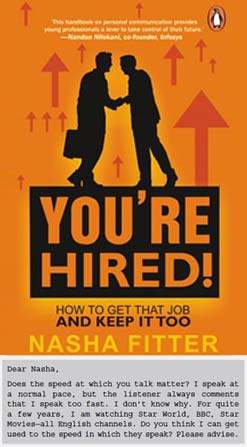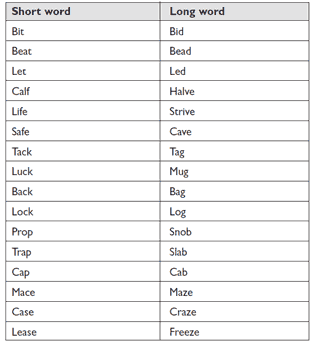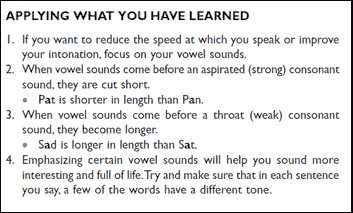
Good communication skills play a huge role in the recruitment process and job applicants who have weak skills are decidedly at a disadvantage. But what exactly are communication skills and how can you perfect yours well enough to get you your dream job?
Nasha Fitter
, a teacher, entrepreneur and expert on communications and soft-skilled training, recently launched You're Hired! a book that helps job seekers improve their English communication and job placement skills.
Rediff.com
will present a series of excerpts from the book in the coming weeks, and also feature chats with Nasha discussing the topics and intricacies of the job application process.Here we present the fourth part of the series, Section II: I speak to fast and tonelessly:
I received this email [in the pic alongside] from one of my students. Speaking too quickly is a problem many of us face. For one, we tend to think faster than we speak, so we are always in a hurry to finish our sentences. Unfortunately, listeners cannot absorb information at the same rate. This is why we must try to slow down our pace and take deep breaths while we speak.
It may come as a surprise that the pace of your speech is linked to vowel sounds. We can decrease the speed at which we speak by stretching vowel sounds while speaking. In India, many of us shorten our vowel sounds to such an extent that not only do we speak too fast, but the actual words start sounding like other, similar words.
Vowel sounds also add flavour and excitement to our voices. By stretching them and adding emotion to them, we can become more persuasive and effective speakers.
Excerpted from
You're Hired! (Rs 199) by Nasha Fitter with the permission of publishers Penguin Books.In this continuing series, we will be featuring excerpts from
You're Hired! covering topics such as pronunciation, speech, accent, email, interpersonal communication and professional etiquette. The author, Nasha Fitter, will also address reader queries every Friday at 12 noon. Get useful interview tips at Nasha's blog: https://nashafitter.rediffiland.com. So if you need help with your job search and career, watch this space!
In the previous chapters, we learnt the differences between aspirated and throat sounds.
As we have already learned, aspirated sounds are stronger than throat sounds because they are caused by the force of air coming out of the mouth.
When a vowel sound falls before a consonant sound that is an air sound (strong sound), it is cut short. For example, let's take the word 'mat'. Just as you begin getting the 'a' sound out, the strong consonant 'tah' sound follows and cuts the 'a' in half.
Now, let's look at the word 'mad'. Here, the 'a' sound is followed by a consonant sound that is a weak, throat sound. Since 'da' is a weak sound, it cannot cut the 'a' sound in half. In fact it joins hands with the 'a' sound as they complete the word together.
So, what we see is that in the word 'mat', the 'tah' sound does not need the 'a' sound to finish the word. It is strong and can complete the word on its own.
The 'da' sound on the other hand, needs the 'a' sound's help to finish the word 'mad'. So, the 'a' sound becomes even longer.
Because of this, the word 'mat' will always be shorter in length than the word 'mad'.
Rules to remember:
! When vowel sounds come before strong consonant sounds, they are shorter. When vowel sounds come before weak consonant sounds, they are longer.
In this continuing series, we will be featuring excerpts from You're Hired! covering topics such as pronunciation, speech, accent, email, interpersonal communication and professional etiquette. The author, Nasha Fitter, will also address reader queries every Friday at 12 noon. Get useful interview tips at Nasha's blog: https://nashafitter.rediffiland.com. So if you need help with your job search and career, watch this space!

It is very important that you stretch your vowel sounds when required and make sure the words you say are of a proper length. For instance, let's take the two words we used earlier -- 'mat' versus 'mad'.
As it is, the 'tah' and 'da' sounds are very similar -- they have identical tongue placements. If you are speaking to someone over the phone, it is possible that they may not be able to differentiate between your 'tah' and 'da' sounds. But they will be able to tell what you are saying by the length of the vowel sounds in the words.
That's right! Human beings actually programme themselves to recognize words based on the length of the word.
If we fail to stretch our vowel sounds when required, we end up being misunderstood, especially when talking to a larger global audience.
Practice exercise
Practise saying the following words [in the image alongside] out loud row by row. First say the short word, and then say the long one. For the long word, make sure that you stretch the vowel sound so that the word sounds longer than the corresponding short word.
In this continuing series, we will be featuring excerpts from You're Hired! covering topics such as pronunciation, speech, accent, email, interpersonal communication and professional etiquette. The author, Nasha Fitter, will also address reader queries every Friday at 12 noon. Get useful interview tips at Nasha's blog: https://nashafitter.rediffiland.com. So if you need help with your job search and career, watch this space!

What is intonation?
Intonation is the tone and pitch of your voice.
Changing your pitch is not a very effective way to communicate. Changing the tone is what will make your speech more interesting.
Why intonate?
! No matter whom you are speaking to -- your employer, a business associate, your wife, husband, girlfriend or boyfriend, even your children -- you will be far more effective if you modulate the tone of your voice.
How do I intonate?
Vowel sounds add to the emotion, or intonation in our voices. Good communicators know how and when to stretch or emphasize certain vowel sounds to get their meaning across.
Practice exercise
Let us pretend someone has asked you to do something, which you just cannot do.
Many of you will have emphasized on the word 'can't' while changing your tone. Do the exercise again, and this time pay attention to the fact that when you changed your tone, the consonant sounds in the word 'can't' -- the 'kah', 'na' and 'tah' sounds -- pretty much stay the same.
The reason the word 'can't' sounded friendly the first time and angry the second was really due to the way in which you altered the vowel sound 'a'.
In this continuing series, we will be featuring excerpts from You're Hired! covering topics such as pronunciation, speech, accent, email, interpersonal communication and professional etiquette. The author, Nasha Fitter, will also address reader queries every Friday at 12 noon. Get useful interview tips at Nasha's blog: https://nashafitter.rediffiland.com. So if you need help with your job search and career, watch this space!